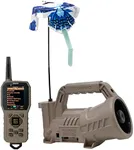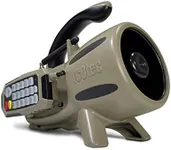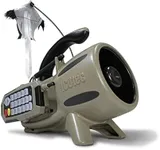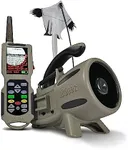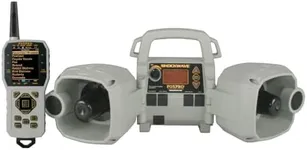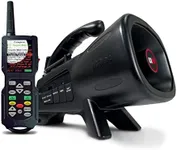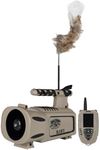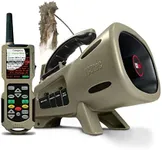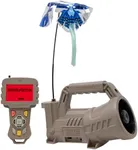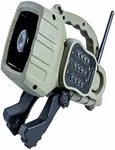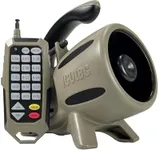Buying Guide for the Best Coyote Hunting Calls
When it comes to choosing the right coyote hunting call, it's important to understand the different features and specifications that can impact your hunting success. The right call can make a significant difference in attracting coyotes and ensuring a successful hunt. Here are some key specifications to consider when selecting a coyote hunting call, along with explanations to help you make an informed decision.Type of CallCoyote hunting calls come in two main types: mouth calls and electronic calls. Mouth calls require you to blow into them to produce sounds, giving you more control over the call but requiring practice to master. Electronic calls, on the other hand, use pre-recorded sounds and are easier to use, often coming with remote controls for convenience. If you are a beginner, an electronic call might be a better choice due to its ease of use. Experienced hunters might prefer mouth calls for the versatility and control they offer.
Sound QualitySound quality is crucial because realistic sounds are more likely to attract coyotes. High-quality calls produce clear, natural sounds that can mimic the distress calls of prey or the howls of other coyotes. When evaluating sound quality, listen to sample sounds if possible. For electronic calls, check the speaker quality and the range of sounds available. For mouth calls, consider the materials and design that affect sound production. Choose a call with high sound fidelity to increase your chances of success.
Volume ControlVolume control allows you to adjust the loudness of the call, which is important for different hunting situations. In open areas, you might need a louder call to reach distant coyotes, while in dense cover, a softer call might be more effective. Electronic calls often come with adjustable volume settings, while mouth calls require you to control the volume with your breath. Look for a call that offers a wide range of volume options to adapt to various hunting environments.
DurabilityDurability is important because hunting often involves harsh outdoor conditions. A durable call will withstand rough handling, extreme temperatures, and moisture. For electronic calls, check for water-resistant or waterproof features and sturdy construction. Mouth calls should be made from robust materials that can endure repeated use. Choose a call that is built to last, ensuring it will perform well in the field over time.
Ease of UseEase of use is a key factor, especially for beginners. Electronic calls are generally easier to use, with simple controls and pre-set sounds. Mouth calls require more skill and practice to use effectively. Consider your experience level and how much time you are willing to invest in learning to use the call. If you prefer a straightforward, user-friendly option, an electronic call might be the best choice. If you enjoy the challenge and customization of using a mouth call, that could be a better fit for you.
PortabilityPortability is important for hunters who need to carry their gear over long distances. Lightweight and compact calls are easier to transport and handle in the field. Electronic calls can vary in size and weight, so look for models that are designed for easy carrying. Mouth calls are typically small and lightweight, making them highly portable. Choose a call that fits your hunting style and the amount of gear you are comfortable carrying.
